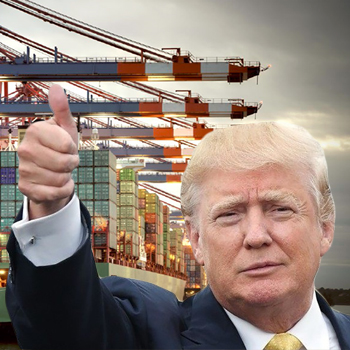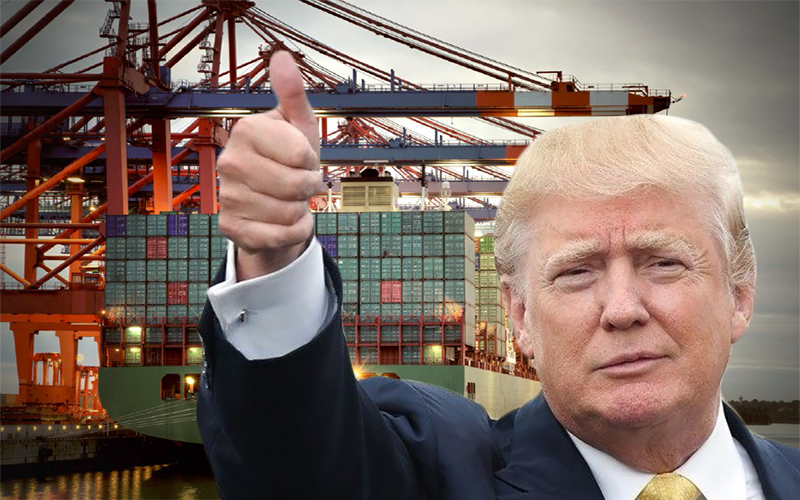On the heels of Republican Presidential candidate Donald Trump’s comments and observations on globalization and free trade, his proposals ostensibly lack what is needed to truly make a difference or improve the current global trade outlook.
That was the general consensus from Panjiva, an online search engine with detailed information on global suppliers and manufacturers.
But before delving into Panjiva’s observations, here is a quick primer regarding Trump’s takes on globalization and trade culled from various media reports:
- Globalization has made the financial elite who donate to politicians very wealthy while leaving millions of workers in poverty;
- Current trade policies like NAFTA (which he said the U.S. could exit if needed, should he get elected) and the proposed Trans-Pacific Partnership (TPP) are viewed as failures by Trump, who prefers to focus on bilateral trade agreements instead of multinational deal-based ones; and
- Trump considers China a currency manipulator and would plead his case to the World Trade Organization and place tariffs on Chinese-bound exports to the U.S.
Based on Panjiva’s data, 2015 U.S. export goods was roughly $1.5 trillion, with its three largest trading partners, Canada, Mexico, and China, buying around $620 billion worth of products from the U.S. per year.
So based on Trump’s disdain for NAFTA and China’s currency manipulation, Panjiva said Trump essentially would be “picking fights” with customers representing 41 percent of U.S. exports, which also includes TPP countries.
What’s more, the firm noted that picking fights with trading partners is unlikely to bring jobs back to the United States, adding that, in fact, nothing is likely to bring substantial numbers of manufacturing jobs back to the United States.
And, separately but related, Panjiva explained how British support for Brexit served as a warning to Europe’s leaders that globalization is not delivering inclusive growth, also explaining that support for Trump should serve as a similar warning to America’s leaders.
Panjiva Research Analyst Chris Rogers said in an interview that re-opening trade deals with a view to making them less wide-ranging or more restrictive is virtually unheard of outside of situations of conflict.
“There is also a case of being careful what you wish for-for every item that the U.S. doesn’t like, there’ll be something it benefits from that someone else wants taking back,” he said.
“Sadly, too, there have been plenty of reports that Trump has a track record in business of not honoring contracts, or renegotiating them after services have already been delivered. Bottom line: they won’t be acceptable.”
In regards to bilateral trade deals, which Trump prefers compared to multinational ones, Rogers noted that bilateral works for the U.S. because it is such a big market and therefore is, in most instances, likely to be able to “win” more than it ‘gives away.
Bilaterals, he explained, have the advantage of being simpler, citing the complexities and time it takes to deliver TPP, TTIP, CETA and the Doha round as examples of what multi-lateral or (others) take to achieve.
As for China and currency manipulation, Rogers observed that the strong dollar/weak yuan is arguably more a function of U.S. monetary policy versus the rest of the world than anything else.
“It is true that the PBOC (People’s Bank of China) controls the Yuan peg rate and therefore has discretion over the exchange rate though,” he said.
“Placing tariffs on Chinese goods in response to this seems strange. Would they be varied according to where the Yuan has gone?”
“The endgame here is clearly an attempt to get China ‘to the table’ to talk about trade policy more broadly. Perhaps as smart a dealmaker as Mr. Trump professes to be, [he] should be able to sign a ‘grand deal’ to bring RCEP and TPP together and finally reach a rapprochement with China on trade.”
With roughly four months until Election Day, lots can, and likely will, change in regards to candidates’ policies and outlooks between now and then.
It is clear that Trump has signaled that the current policies and processes are not working as well as they need to at this point. In this and really every political climate, there will be pushback, disagreement, and some tension, too, but in any event it will clearly be worth following between now and November.
Related Article: Can Trump Bring Apple Manufacturing Jobs To USA?
About the Author
Follow Robotics 24/7 on Linkedin
Article topics
Email Sign Up


















